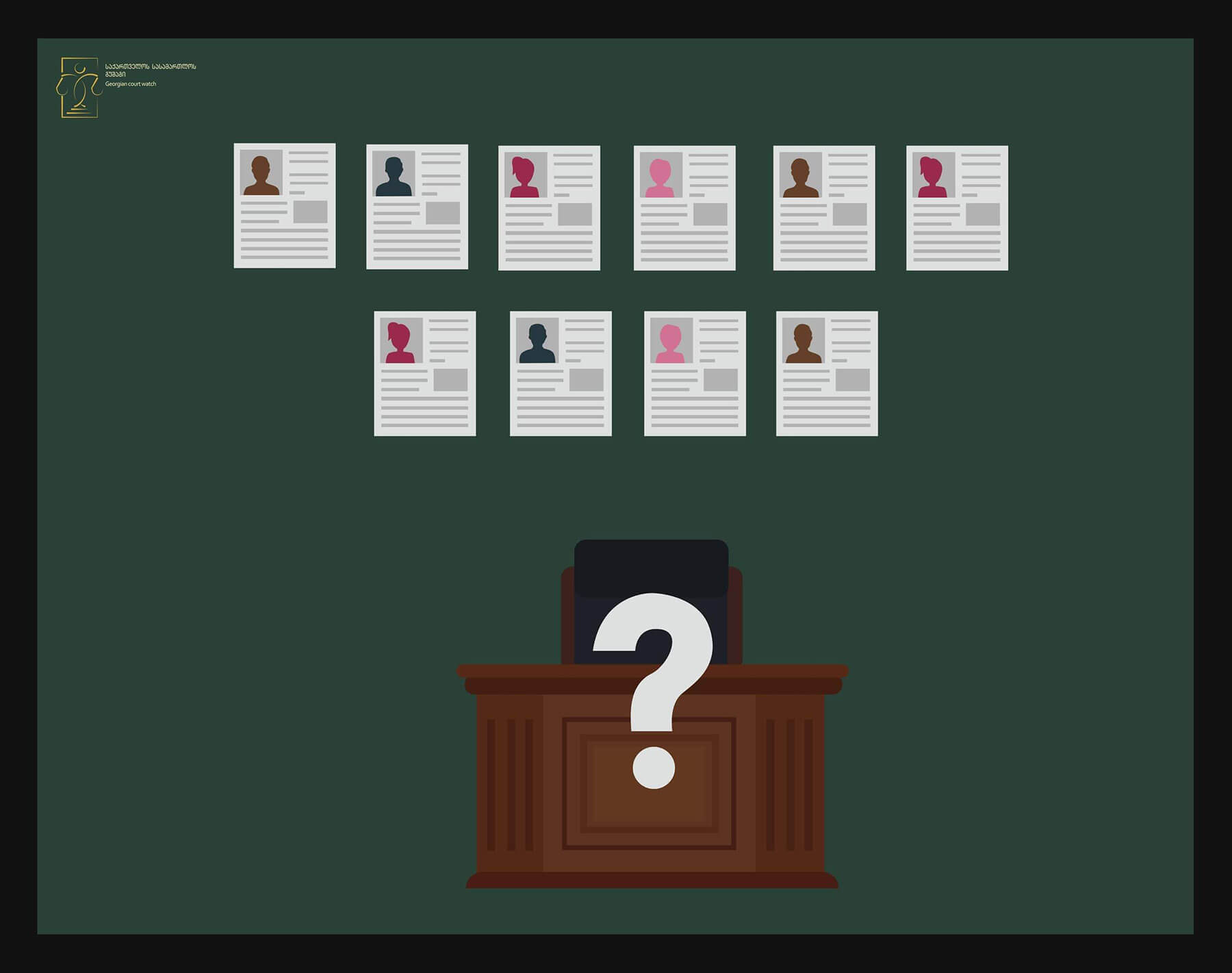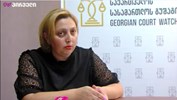Why are dozens of vacant seats of judges not filled?
Table of contents
- Announcement of the competition in the first and second instances for appointing a judge
- Staffing of the Supreme Court-a different rule
- The High Council of Justice determines the number of judges
- Vacancies of judges by years
- The double standard of publicity and transparency
- A judge is a judge and there is a public interest in all of them.

Violation of the terms defined by procedural legislation by common courts and ignoring the requirement of reasonable terms provided for by the European Convention on Human Rights has become a common practice in Georgia. "Delayed justice often equals denial of Justice."1 regardless of the final outcome of the proceedings, procrastination makes it ineffective.2 among many, the reason often cited is an insufficient number of judges. Paradoxically, the situation is caused by various factors, one of them - legislative barriers will be discussed in the article.
Announcement of the competition in the first and second instances for appointing a judge
Within the framework of the third wave of judicial reform, 2017, 8 February legislative amendments changed the rule of appointment of judges and the procedure of holding competitions by the High Council of justice was adjusted in a new way.
In case of vacant positions of judges in District (City) and appellate courts, the High Council of Justice announces a competition.3 Organic law does not specify the specific time frame for the competition; moreover, the High Council of justice is not obliged to take measures in advance to ensure the required number of judges. Accordingly, the High Council of justice can announce a competition when it considers it necessary.
Staffing of the Supreme Court-a different rule
Unlike the first and second instances, in the case of the selection of candidates for the Supreme Court judges, the deadline for announcing the competition is clearly defined. The High Council of justice starts the selection process of candidates no later than 3 months before the vacancy for the position of a judge of the Supreme Court or no later than 1 month after the termination of the term of office of a judge of the Supreme Court.4 thus, the judicial authority may hold the reserve prior to the release of the judge's seat.
The power to select candidates for Parliament was transferred to the High Council of justice as a result of the constitutional reform of 2018. The Constitution of Georgia also determined the number of judges of the Supreme Court. Since 2019, the Organic Law of Georgia" on common courts " has reflected the detailed rule of selection of candidates for Supreme Court judges. The originally initiated draft law provided for the obligation to announce the competition within one month after the vacancy has arisen,5 however, finally it was established that the High Council of Justice announces the procedure for selecting candidates for the Supreme Court judges at least 3 months before the vacancy has arisen.
The authors of the draft law explained the initiative to define the detailed rule of selection of candidates for Supreme Court judges by the necessity of transparency and Publicity of the process, which would facilitate to conduct of the whole process under public observation.6 according to the explanatory note, it was necessary to define the issues related to the selection of candidates by law in order to allow all suitable candidates to participate in the process, on the one hand, and on the other hand, the public to have confidence in the process.7
The High Council of Justice determines the number of judges
The High Council of Justice determines the number of judges in the city (district) and appellate courts. In addition, the High Council of Justice of Georgia shall determine the number of judges in the judicial collegiums and the composition of the judicial collegiums. Accordingly, its competence is to determine the number of vacant seats of judges and to announce the competition for relevant seats.
There are various grounds for generating a vacancy in court, such as:
- Expiry of a judge's term of office;
- Early termination of a judge's powers;
- Reaching retirement age by Judge;
- Adding States by the council (increasing the number of staff).
Based on the listed factors, dozens of vacant seats have appeared in the courts of first and second instances in recent years, however, the council was in no hurry to announce the competition and fill the vacant seats in a timely manner. It is obvious that there is no policy that would facilitate the introduction of new personnel into the system and the renewal of the judicial system.
Vacancies of judges by years
According to the data of recent years, based on the information provided by the High Council of Justice on October 2021, 26:
- In 2017 - competition was announced for 136 vacant seats and only 98 judges were appointed, and finally, on various grounds, 55 vacant seats remained free;
- In 2018 - a competition was announced for 43 vacant places and 32 judges were appointed. Finally, on various grounds, 45 vacant seats remained free;
- In 2019 - on various grounds, 99 vacant seats were free and the council did not announce competition at all;
- In 2020 - only once a competition was announced and 36 judges were appointed. Finally, on various grounds, 78 vacant seats remained free;
- In 2021 - twice the competition was announced, for a total of 88 vacancies; 47 judges were appointed. As of September 20, 2021, 90 vacant seats remained free.
It is noteworthy that the High Council of Justice took seven months to appoint 7 judges.
The competition was announced on August 2021, 5, and the decision on the appointment was made on March 2022, 7. In 2022 (including August), the competition for the selection of judges has not been announced at all.
The available data prove that the vacant seats of judges cannot be filled as a result of the competition and the number of appointed judges is much smaller. As a result, we get the situation when the courts of the first and second instances operate in conditions with an insufficient number of judges.
It is unclear what principles the High Council of justice is guided by when making a decision regarding the announcement of a new competition. It is obvious that the current legislative norm and the practice of its application by the council cannot create an effective mechanism for the timely provision of the court with a sufficient number of judges.
The double standard of publicity and transparency
The deadline for announcing the competition is not the only factor that distinguishes the selection of judges of the first and second instances from the selection process of candidates for the Supreme Court. The legislator also sets different standards of publicity and transparency for interviewing candidates. In particular, the Organic Law imperatively establishes the publicity of interviews with candidates for judges of the Supreme court,8 when interviews with candidates for judges of the first and second instances courts are usually closed unless the candidate himself/herself requests his / her disclosure. It is interesting why such transparent and open procedures are not defined for the selection of judges of the city and appellate courts as in the selection of candidates for the Supreme Court.
A judge is a judge and there is a public interest in all of them.
Organic law defines a multi-stage procedure for appointing judges of the first and second instance courts. And this is connected for quite a long time. Accordingly, a timely announcement of the competition, taking into account the duration of the selection process, is of even greater importance.
The presence of vacant seats of judges over a long period of time increases the individual workload of judges, which directly affects the pace and quality of their judicial activities, and the final results are reflected in the service received by the users of Justice, which is neither fast nor high enough and far from the ideals of Article 6 of the European Convention.
One gets the impression that there is no will to update the judicial system and timely introduce new personnel into it, so as not to jeopardize the existing influence.
Thus, it is important that the High Council of Justice interprets the norm in good faith, in the interest of effective legal proceedings. In addition, the first paragraph of the Article 35 of the Organic Law of Georgia on common courts "in case of vacant positions of judges in District(City) and appellate courts, the High Council of Justice of Georgia announces a competition through an official printing body of Georgia" and determine the deadlines for announcing the competition, as it is obvious that insufficient clarity of the law leads to a large number of judicial vacancies (up to 100 seats of judges in common courts are vacant this year).
Footnote
1. Vazagashvili vs Georgia 50375/07; 18.10.2019
2. The same.
3. Organic Law of Georgia" on common courts", art. 35, pun. 1.
4. Organic Law of Georgia" on common courts", art. 341, pun. 1.
5. Draft organic law on amendments to the Organic Law of Georgia on common courts; 4526; N07-3/301/9; P. 1.
6. Explanatory note on the draft organic law on amendments to the Organic Law of Georgia on common courts; 4526-II, 11.03.2019, P. 8.
7. The same. Us. 9.
8. Organic Law of Georgia" on common courts", art. 341, pun. 8.
---
The materials distributed by courtwatch.ge and published on the website are the property of "Georgian Court Watch", when using them, "Georgian Court Watch" should be indicated as the source.































